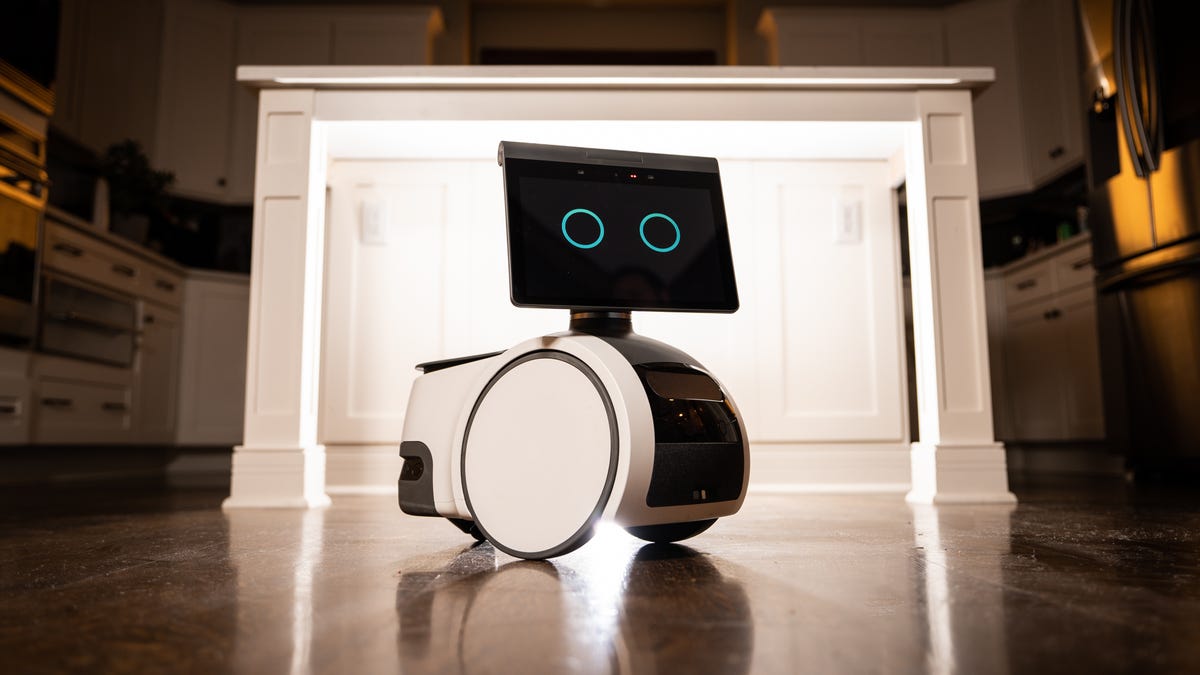Amazon Astro's Newest Tricks Don't Include Letting You Buy One
The home robot was unveiled a year ago and just got upgraded, but purchasing one is still by invitation only.

Astro learned some new tricks, like keeping track of your pets and your doors and windows.
No, you can't order an Amazon Astro yet.
Amazon announced updates to the endearingly expressive robot, a rolling mash-up of Ring and Alexa features with a telescoping camera, at its annual devices and services event on Wednesday. For example, Astro will be able to run automated programs to update you on your pets' antics or whether you've left open a window or door in updates that will be available in the coming months.
Not announced: Astro's public release date.
Amazon revealed Astro in an out-of-left-field announcement at the finale of its annual event last year. The company considers Astro to be an experimental product, which is why it's still only available for purchase for $1,000 by invitation. The company says it's received hundreds of thousands of requests for invitations, and the robot will cost $1,450 when released to the public.
More from Amazon's event
Astro represents one of the more audacious examples of Amazon's bid to touch every part of our lives through everything from its retail services to its array of smart Echo speakers. It's also the latest instance in which it appears to have run ahead of its ambitions (remember Amazon Prime Air, aka its drone service announcement, back in 2013?). However, because the technology is so new, Amazon has opted to refine and grow Astro's features in real time as its select group of customers use the robot in their homes.
Astro will be able to provide pet monitoring during its regular patrols. The robot can send notifications with photos or videos of pets during these encounters. To keep the notifications manageable, Astro won't text a pet owner more than once in a 5-minute period. People can also customize the frequency of Amazon's patrols, which are an opt-in feature. Ken Washington, vice president of consumer robotics at Amazon, said he uses the feature to keep track of his cat when he's out of the house.
"I get the little notifications," Washington said. "It just makes me smile every time."
To monitor your doors and windows, Astro will learn where each one is by following you through the home and documenting them as you point them out. Astro will also learn what your door or window looks like when closed or open on the tour and then asks you if it got it right when it updates you about an open door in the future to refine its learning.
More automation in Astro's future
As CNET reviewer David Priest found while spending time with the robot this year, Astro is in search of a purpose. It can serve as a mobile home security system, a voice assistant that can come to you from another room or simply a very expensive product for conveying drinks from the kitchen to the den (as long as they're on the same floor).
Wednesday's event only added a couple more ways to use the device, but Astro's new automated features provide a hint of what it might be capable of in the future. The automated pet-monitoring feature was built with a new software development kit Amazon created for Astro. Three university robotics programs will have access to that code later this year, letting them create new "routines" for Astro to complete. The programs are at the University of Michigan, the University of Maryland and Georgia Tech. Eventually, a wider group of coders could access the software.
That could open up more possibilities for Astro. Right now, the robot can go on automated patrols around the house, but more specific actions like checking whether the stove is off must be carried out by a human with access to the companion app. In the future, Astro could check the stove as part of routine patrols and then text you a photo if your burners are blazing while you're out of the house.
Astro goes to the workplace
Astro is also finding a purpose beyond the home, courtesy of its onboard Ring-compatible technology. Ring's Virtual Security Guard service already lets live response agents monitor the cameras in homes and small businesses that subscribe to it. Now Astro will work with that service for select firms within the next few months as part of a pilot program for small and medium-size businesses.
Whatever Astro sees, those live agents will see and respond accordingly if something's amiss. Business owners also need Ring Alarms and a Ring Protect Pro subscription for the integration to work.
A Ring spokesperson said the service will be a good fit for facilities that are hard to monitor with stationary cameras alone. It could also serve, the spokesperson said, "as an affordable alternative to hiring a human security guard by bringing Astro's physical presence and the rapid human response of a professional agent together in a single business monitoring solution."
With autonomous steering capabilities and built-in cameras, Astro is designed to move independently through its environment, and it's capable of separating strangers from known users on sight. Piloting it out as a roving security bot could be a way for Amazon to demonstrate one of Astro's key use cases ahead of that launch.



